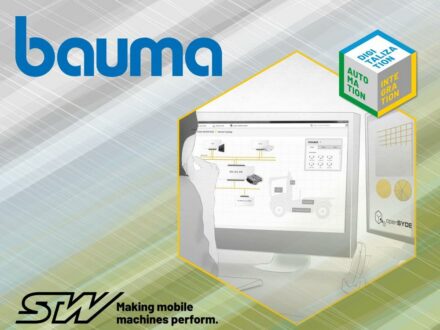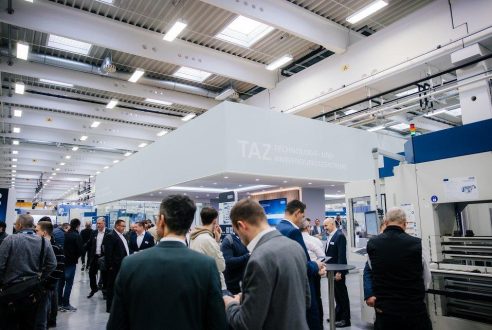Versatile learning options in KHS Campus
Training has always held a high status at Coca-Cola Europacific Partners Germany GmbH in Mannheim. Here, for example, the beverage producer was one of the first of 14 production sites in the federal republic to begin using augmented reality (AR). All teaching methods – from on-site training to online seminars – have a common disadvantage, however: they are time-consuming, require planning and are limited in their flexibility.
This is where KHS’ Virtual Training Center or VTC comes into play, providing a unique solution: operators can make spontaneous and independent use of even short breaks in production to familiarize themselves with specific functions of a line without being tied down to fixed training schedules. This is a benefit that held immediate appeal for Markus Straßer, head of Maintenance at Coca-Cola Mannheim. He was also convinced by the fast implementation thereof: within just one week after submitting his request, the Dortmund turnkey supplier had provided him with access to the VTC. The training center itself is also proving very popular. “A sound onboarding process for our colleagues is essential for optimum operation. KHS’ range of training courses has thus quickly become an important module for us.” In the highly flexible operation of a modern filling plant, employees must quickly be able to carry out their duties independently, safely and with confidence. There’s often not enough time for full personal induction into all of the details. Learning inhibitions must therefore be kept to a minimum. As Straßer is responsible for all maintenance on site, he’s familiar with the challenges associated with shift models and the demographic change in the workforce. “Flexibility is absolutely necessary when assigning personnel,” he says. “If newer colleagues can get to grips with the various functions on their own through a playful learning approach that’s also fun, then we have a great basis from which we can then move on to familiar study formats.” The fact that what’s learned here is sufficient to actively participate in the production process is of huge value, he adds.
Virtual training supplements classic formats
This is also KHS’ plan. Last year, the systems provider pooled its training program in KHS Campus and with the VTC closed a gap in the market. Training on site, seminars on more complex topics or specific personnel development are still the key tools in the program that provide customers with the best way of teaching specialist knowledge and expertise in each specific case.
Exploring individual machines or entire beverage lines with the help of an avatar and navigating to study points on an exemplary digital twin open up new avenues. “The initial response has been extremely positive,” states the maintenance manager. “Thanks to the intuitive and playful approach from the individual’s personal perspective, even our older colleagues are able to perfectly manage this setup.” At the VTC they have access to interactive and instructive learning nuggets or small, compact teaching units. Employees who successfully complete these are given small virtual rewards and can track their learning progress themselves. As in a game, this encourages participants to finish the current unit with an even better rating or to complete the next one just as well.
As these nuggets can be used spontaneously at any time, such as during short breaks in production, all new employees quickly gain an impression of the entire machine. “In our case, we’re specifically training people in palletizing,” says Straßer, who has already decided to further expand virtual training together with KHS in the future. He’s convinced that although “it doesn’t replace in-person formats, it will become a fixed feature of onboarding.”
New modules and languages to be added
For KHS, the study format currently available in English and German is just the beginning, explains Marco Palme, head of KHS Training Center South and VTC project manager. “As no additional hardware is needed to use the VTC other than a totally normal Office PC, we can roll it out worldwide within a very short space of time indeed.” The only limiting factor is that the customer’s plant isn’t too old, as it needs to match the digital twin in the VTC for learning to be as effective as possible. “Over the next few months, we’ll not only be integrating more languages but also all other machines in the KHS Group for all standard container types, one after the other,” Palme concludes.
The KHS Group is one of the world’s leading manufacturers of filling and packaging systems for the beverage and liquid food industries. Besides the parent company (KHS GmbH) the group includes various subsidiaries outside Germany, with production sites in Ahmedabad (India), Waukesha (USA), Zinacantepec (Mexico), São Paulo (Brazil) and Kunshan (China). It also operates numerous sales and service centers worldwide. KHS manufactures modern filling and packaging systems for the high-capacity range at its headquarters in Dortmund, Germany, and at its factories in Bad Kreuznach, Kleve, Worms and Hamburg. The KHS Group is a wholly owned subsidiary of the SDAX-listed Salzgitter AG corporation. In 2023 the KHS Group and its 5,400 employees achieved a turnover of around €1.517 billion.
KHS GmbH
Juchostr. 20
44143 Dortmund
Telefon: +49 (231) 569-0
Telefax: +49 (231) 569-1541
http://www.khs.com
external PR consultant
Telefon: +49 251 6255 6123
E-Mail: khs@information-presse.de
![]()





